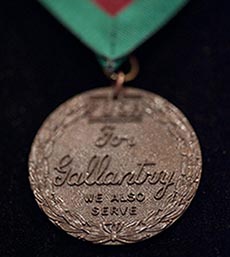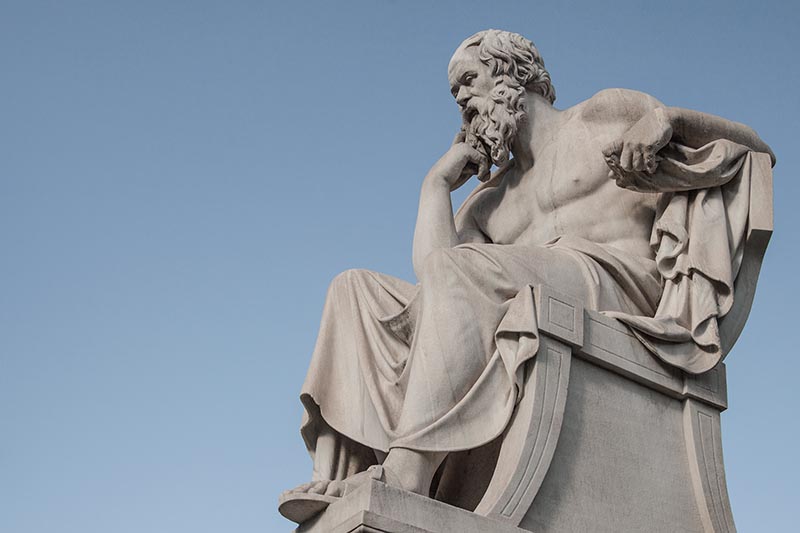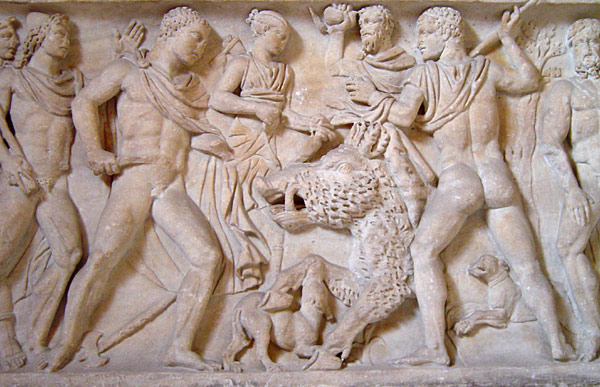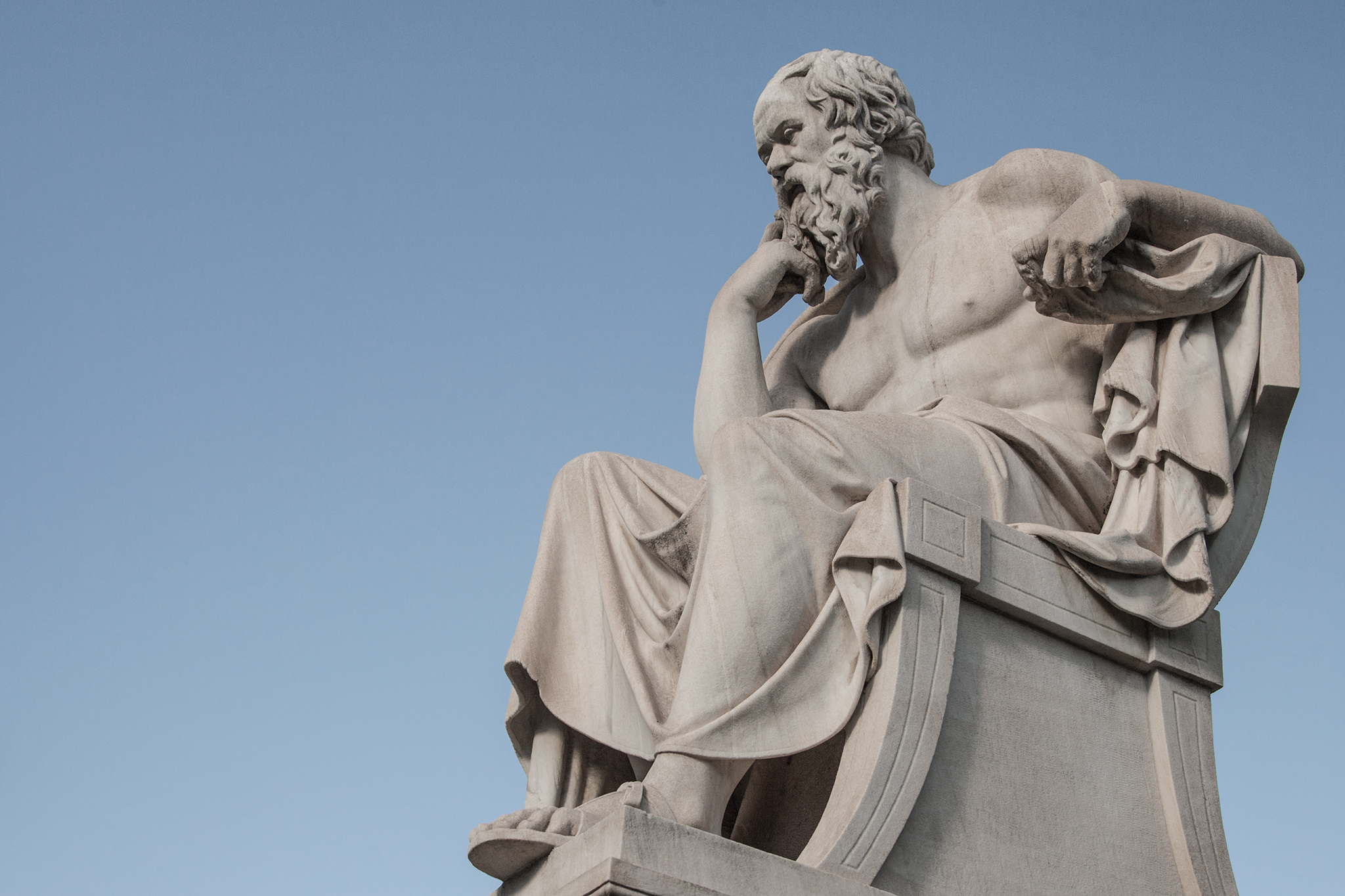 The Dickin medal
The Dickin medal
Ancient poets, for example, often highlight the courage of heroic characters by comparing them with animals such as lions or boars. The idea that non-human animals can be courageous is not confined to the ancient world: in 1943, Maria Dickin, founder of the People’s Dispensary for Sick Animals, created the PDSA Dickin Medal to honour animals who played a role in World War II.
According to the PDSA website, the Dickin Medal is awarded to animals that have displayed "conspicuous gallantry or devotion to duty while serving or associated with any branch of the Armed Forces or Civil Defence Units". There is, then, a very long tradition of regarding animals as capable of courage.
Not everyone would agree. In Laches – a work by the ancient Greek philosopher Plato (c. 427–347 bce) this tradition is called into question. Plato’s discussion raises some broader issues about the nature of courage and how it relates to moral knowledge or understanding.
Like most of Plato’s works, Laches is written as a dialogue between a small number of characters. Plato’s dialogues are set in the recent past, and most of the characters are real people who were well known at the time. They include politicians, intellectuals and performers.
In Laches, the characters include Plato’s old teacher and mentor Socrates. Socrates wants to know what courage is. He puts the question to two other characters – Laches (who gives his name to the dialogue) and Nicias. Laches and Nicias were both generals in the Athenian army, so might be expected to know what courage is.
 Socrates statue in front of the Academy of Athens. Leonidas Drosis and Attilio Picarelli, 1885.
Socrates statue in front of the Academy of Athens. Leonidas Drosis and Attilio Picarelli, 1885.
When Socrates puts the question to Nicias, Nicias gives what might sound like a rather surprising answer: courage, he says, is knowledge. The irascible Laches splutters at this and insists that Nicias says more. Courage, Nicias explains, means knowing what we should fear and what we should find encouraging.
Nicias seems to be suggesting that a courageous person is someone who knows the value of things: it is a kind of moral or ethical knowledge. A courageous person, according to Nicias, is someone who knows whether it is worth sacrificing his or her life for a particular cause, or whether it is worth risking wealth and reputation for the sake of a particular principle.
In contrast, a cowardly person will be someone who overestimates the value of his or her own life and comfort in relation to other important goals; while a foolhardy person will be someone who ignorantly puts too little value on their personal safety.
This raises a lot of questions. One question we might ask is whether Nicias is right to suggest that this kind of knowledge is the only thing needed for courage. Even if courage does require this kind of knowledge, might it not require something else too – something like nerve or mettle?
But we might also wonder whether courage requires knowing anything at all. It might be argued that Nicias’s suggestion turns courage into something altogether too intellectual: it makes courage a matter of head, when it is really a matter of heart. Indeed, the knowledge Nicias has in mind seems to be quite sophisticated: it requires a grasp of moral values and the ability to weigh those up against the risk of harm.
It is this second worry that Socrates chooses to press. The knowledge Nicias is talking about, Socrates says, ‘is not something any pig would know’ (Plato/Lane 2005: 109). According to Nicias then, a pig couldn’t be courageous; nor could a leopard or lion or a stag.
 The mythical Calydonian Hunt
The mythical Calydonian Hunt
Laches thinks that this is a fatal objection to Nicias’s suggestion. Laches is assuming that it is just obvious that boars, stags and lions can be courageous, even though they do not have the kind of knowledge Nicias is describing.
Nicias, though, digs in his heels. Animals, he insists, cannot be courageous. And this is just because they do not have the ability to predict danger and weigh up risks. Rather, they rush into danger without fear because they do not understand the risks. Being courageous, he says, is not the same thing as fearlessness. Courage means recognising the risks, but running them anyway because something morally important is at stake. Very few human beings, Nicias says, can do this; boars and lions certainly cannot.
Nicias agrees, then, that his account of courage implies that animals cannot be courageous. But this is a conclusion he is willing to accept. So Socrates and Laches cannot make any further headway with their objection.
Is Nicias right? The issue will depend in part on what kind of trait or quality we take courage to be. On one view, courage can be compared with traits such as strength, intelligence or charm. These traits can help us achieve our goals. But they are not, just in themselves, morally good traits: they can be put to bad ends as well as good.
Alternatively, we might view courage as a moral virtue. On this view, courage can be classed with other moral virtues such as honesty, fairness, generosity or kindness. Having these moral virtues (it might be argued) implies more than just having the right impulses: it means understanding why and when these impulses are morally valuable and acting accordingly.
So, on this second view, a good case can be made for the view that, while lions and boars can be fearless, they cannot be courageous. Indeed, it might be argued that in some cases – cases in which human beings train animals to carry out dangerous tasks – calling the animals courageous sanitises the situation, by implying that they understand and accept the risks.
Like many questions in philosophy, the question might not have a simple answer. For one thing, not all animals are the same. What is true of lions and stags might not be true of chimpanzees, for example. Arguably, too, Nicias’ distinction between fearlessness and courage is too simple: perhaps there are possibilities between merely being oblivious to a danger and understanding why it needs to be faced. In Laches, the characters do not settle the question for us: the dialogue ends in confusion. But that confusion might spur us to think about the question for ourselves.






Rate and Review
Rate this article
Review this article
Log into OpenLearn to leave reviews and join in the conversation.
Article reviews